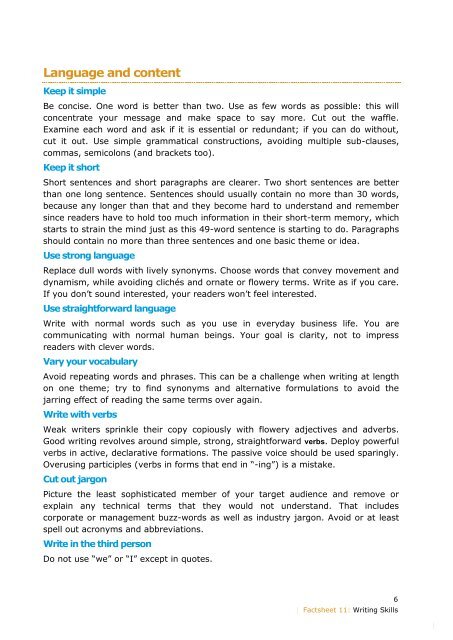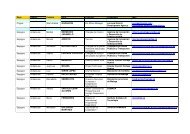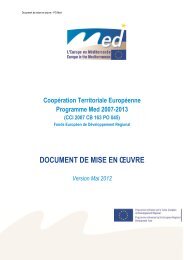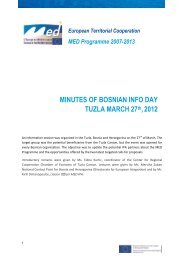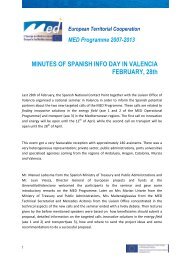MED Communication Handbook - Programme Med
MED Communication Handbook - Programme Med
MED Communication Handbook - Programme Med
You also want an ePaper? Increase the reach of your titles
YUMPU automatically turns print PDFs into web optimized ePapers that Google loves.
Language and content<br />
Keep it simple<br />
Be concise. One word is better than two. Use as few words as possible: this will<br />
concentrate your message and make space to say more. Cut out the waffle.<br />
Examine each word and ask if it is essential or redundant; if you can do without,<br />
cut it out. Use simple grammatical constructions, avoiding multiple sub-clauses,<br />
commas, semicolons (and brackets too).<br />
Keep it short<br />
Short sentences and short paragraphs are clearer. Two short sentences are better<br />
than one long sentence. Sentences should usually contain no more than 30 words,<br />
because any longer than that and they become hard to understand and remember<br />
since readers have to hold too much information in their short-term memory, which<br />
starts to strain the mind just as this 49-word sentence is starting to do. Paragraphs<br />
should contain no more than three sentences and one basic theme or idea.<br />
Use strong language<br />
Replace dull words with lively synonyms. Choose words that convey movement and<br />
dynamism, while avoiding clichés and ornate or flowery terms. Write as if you care.<br />
If you don’t sound interested, your readers won’t feel interested.<br />
Use straightforward language<br />
Write with normal words such as you use in everyday business life. You are<br />
communicating with normal human beings. Your goal is clarity, not to impress<br />
readers with clever words.<br />
Vary your vocabulary<br />
Avoid repeating words and phrases. This can be a challenge when writing at length<br />
on one theme; try to find synonyms and alternative formulations to avoid the<br />
jarring effect of reading the same terms over again.<br />
Write with verbs<br />
Weak writers sprinkle their copy copiously with flowery adjectives and adverbs.<br />
Good writing revolves around simple, strong, straightforward verbs. Deploy powerful<br />
verbs in active, declarative formations. The passive voice should be used sparingly.<br />
Overusing participles (verbs in forms that end in “-ing”) is a mistake.<br />
Cut out jargon<br />
Picture the least sophisticated member of your target audience and remove or<br />
explain any technical terms that they would not understand. That includes<br />
corporate or management buzz-words as well as industry jargon. Avoid or at least<br />
spell out acronyms and abbreviations.<br />
Write in the third person<br />
Do not use “we” or “I” except in quotes.<br />
6<br />
� Factsheet 11: Writing Skills<br />
�


